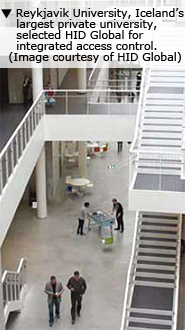A&S examines real-life security implementations from all over the world.
RCG Streamlines Library Operations at Hong Kong Institution
Educational institutions in Asia improve security, work efficiency and automate workflow by employing the latest technologies in RFID and biometrics.
Hong Kong Institution of Vocational Education (IVE), a higher educational institution for vocational education, training and professional development, deployed an RCG RFID library tracking system at one of its campuses. With an enormous number of books at the libraries, a comprehensive tracking system is essential to manage the books and inventory properly. The solution can facilitate book borrowing and returning, especially during peak hours. RCG's system reduces the rate of misplaced books and student queue times when borrowing books.
Implemented with RCG's library system solution, IVE was supplied with a set of hardware and basic software. It includes RFID tags attached to the books, easy-to-use handheld RFID devices which quickly scan books in the shelves for inventory management, and desktop RFID readers for students' self check-in and checkout. RCG also provided consultancy service to enhance learning on RFID development. Students at IVE were able to customize the library system after exploring and experiencing the solution.
Thai Universities Pick Up Fingerprint Access
Two Thai instituions have implemented fingerprint access control and employee attendance solution from RCG. The first school was Mahidol University, one of Thailand's most prestigious universities established more than 120 years ago. The other was Suranaree University of Technology, Thailand's first public autonomous university. Both universities occupy large areas with multiple facilities. Multiple fingerprint access control devices are installed at various locations to help monitor staff attendance and prevent unauthorized access. Not only do RCG solutions help to secure the environment, they also automate employee management records.
RCG continues to bring biometrics and RFID into play in the educational sector by providing various solutions. RCG's RFID guard tour monitoring solution allows security personnel to patrol school premises and perform security checks using RFID-related devices. They can automatically transfer device data to a security control area to enable real-time monitoring.
RCG's latest integrated education solution deploys a multipurpose student RFID card for student attendance, payment and library usage.
Iceland University Deploys HID Integrated Access Solution
Reykjavik University (RU) is a vibrant international university located at the capital of Iceland. Reykjavik University is Iceland's largest private university and has used HID proximity technology for years. About three years ago, the university decided to build a larger first-rate facility to accommodate all of the university's five degree courses.
The university's Technical Manager Ellert Igni Har?arson spent almost a year researching applications suited for RU. RU also worked with Securitas Iceland and the university's building consultant Eirikur Torbjornsson.
RU's vision was to have an almost “key-free” building. “Our vision is to have a true multiapplication smart card that in the future can be enabled for cashless vending, canteen, on-demand printing, photo ID, library, use of lockers and maybe even more,” Ellert said.
Eirikur said, “By planning for a true multiapplication future from the start, with this project we were able to ensure a quick return on investment for the university.”
The university transitioned to HID multitechnology cards and readers, which made migrating to smart cards simple. “From the outset, it was important for us that students who were issued access cards for the old building would be able to use their cards and gain access also in the new building,” Ellert said.
The university charges students a nominal fee for their cards, which according to Ellert has helped to reduce card loss to almost zero, as students associate value to their cards instantly.
 The system now installed at the university also integrates lighting, electrics and room allocation control. “We are trying not only to provide a secure and high-tech facility for our students and staff but to also be green and conscious of our environment around us,” Ellert said. “Such integrated solutions helps us to learn about how rooms and areas within the university are used, allowing us to become ever more intelligent and efficient.”
The system now installed at the university also integrates lighting, electrics and room allocation control. “We are trying not only to provide a secure and high-tech facility for our students and staff but to also be green and conscious of our environment around us,” Ellert said. “Such integrated solutions helps us to learn about how rooms and areas within the university are used, allowing us to become ever more intelligent and efficient.”
Today, HID Global's smart cards provide about 4,000 students access to all the university buildings. Students can upload a photograph of themselves to the university's intranet, so their cards are issued to them on their first day of school with on-site card printers.
The cards are used throughout the old and the new buildings to gain access to classrooms, lab rooms and study areas.
“Iceland itself is a very-forward thinking country and most of our local and international students have been in touch with smart cards and access control cards before,” Eirikur said. “Therefore the adoptation of smart cards was very quick and we have received very good feedback from our students and staff so far.”
Ellert and Eirikur said they were excited about the possible future use and applications of their smart cards. They hope that one day in the not-sodistant future, the university cards can be used on the local bus, the public library and even at the theater.
Nedap Secures University of Nottingham The University of Nottingham
consists of four main sites — University Park, Sutton Bonnington, Jubilee Campus, King's Meadow Campus — which are used by approximately 40,000 students and staff.
The initial tender recognized the need to upgrade the site card technology, so the university could integrate solutions both existing and new. The original card consisted of a dated technology, which was time-consuming and expensive.
The university also recognized the existing access control systems were dated and expansion was limited. The project required a complete retrofit of the access control system using existing cabling infrastructure.
Training and development of key staff was facilitated to manage the system internally. In addition, the provision of a simple method of assigning access templates was imperative, given the size and complexity of the organization.
All systems and services were required to be future-proof, allowing the university to expand the use of the card applications.
Nedap Education replaced the existing access control system with its access control system to control the entry and exit for students and personnel in the buildings. The project successfully utilized one form of identification, which incorporated other identification techniques and offered dual verification where required.
 The controllers were attached to existing IT infrastructure and stored data locally. This removed the need for constant communication with the server, which can slow down performance.
The controllers were attached to existing IT infrastructure and stored data locally. This removed the need for constant communication with the server, which can slow down performance.
The embedded software hardware was programmed to allow different functionalities for each door. This process streamlined the whole allocation of access templates.
Nedap Education developed an online card print service, allowing new staff and students to upload digital photographs, which initiates a production process. Cards are printed, encoded and activated. The cards are then delivered directly to the university or to the member of staff.
The initial project required that all 40,000 cards were reproduced, with the creation of an online service to accommodate the new student intake. This was logistically difficult but achieved with cooperation from the university. By September, the majority of cards had been produced and delivered. The system links directly to the database of the university, with a daily import of changes to staff and students. This system then interfaces with the access control system, automatically updating the card profiles.
A single photo and print system was installed at the university, enabling instant production in the event of lost or damaged cards. The card deployed was a Mifare card, which was integrated with other solutions on-site. The local bus company utilized the card for students on the bus route to the main campus. The card also acts as a library card and still has space to integrate with other systems.